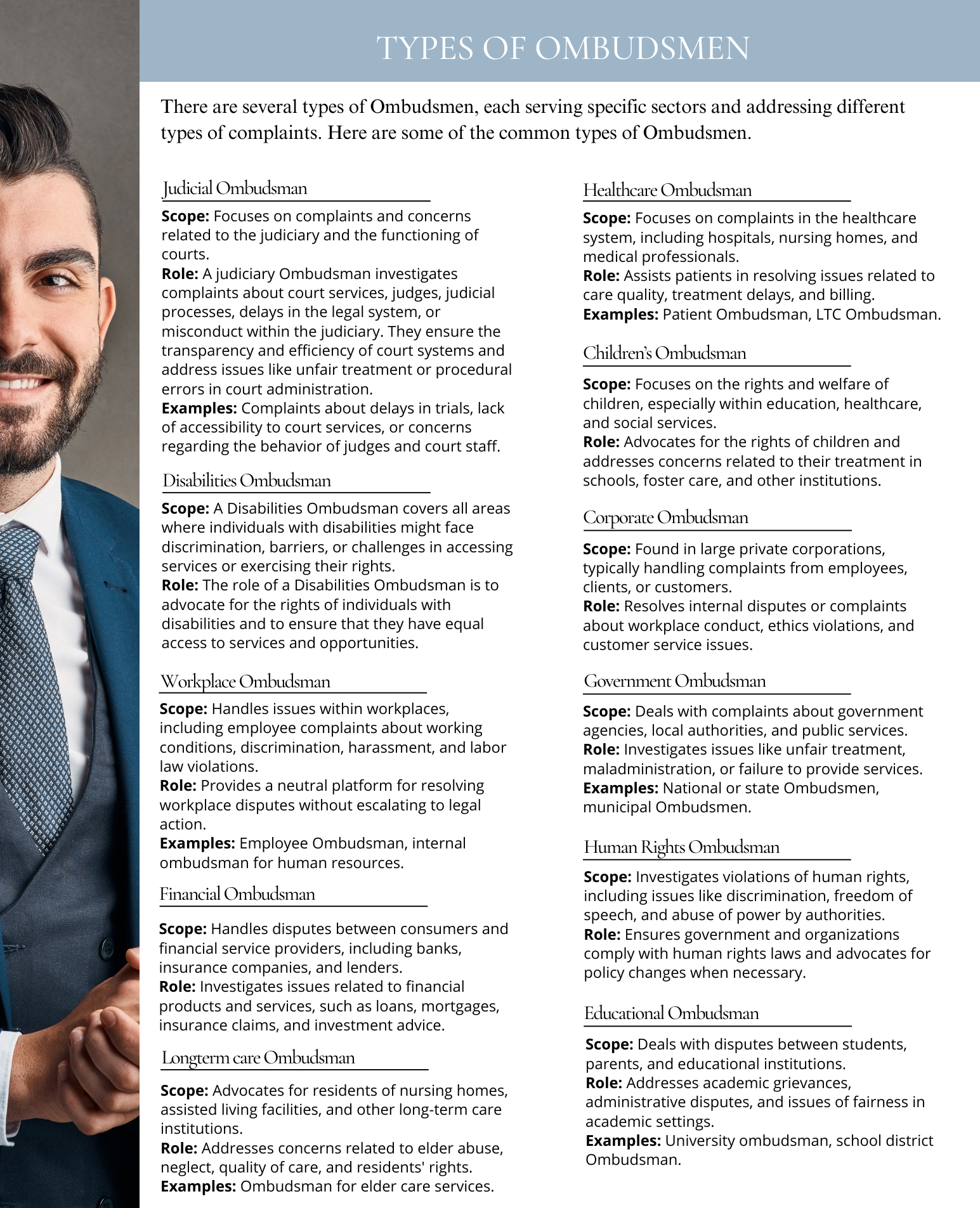Your Advocate Ombudsman

Maneuvering through bureaucracy, whether in government, business, or public institutions, can be a daunting task. An Ombudsman, also known as an Ombud, Ombudswoman, Ombudsperson, or Public Advocate is a valuable resource for anyone facing issues or disputes with large organizations or through the judicial system. Ombudsmen play a critical role in protecting individuals' rights, ensuring transparency, and promoting fairness. This informative article explores what an Ombudsman is, where to find one, what services they offer, and how they can help in legal situations, including their role in courthouses.
An Ombudsman is an independent, neutral official appointed to investigate complaints and disputes between individuals and institutions. These institutions can range from government bodies to private corporations, healthcare providers, and even educational institutions. The role of the ombudsman originated in Sweden in the 19th century and has since been adopted globally as a mechanism for holding institutions accountable.
There are several key functions of an Ombudsman that include investigating complaints by reviewing grievances brought by individuals who feel they have been unfairly treated by an institution. Ensuring fairness by advocating for transparency and fairness in the practices of public or private entities. In addition to providing recommendations by offering non-binding solutions or recommendations to resolve conflicts.
Unlike a court, an Ombudsman does not have the authority to enforce decisions, but their investigations and recommendations carry significant weight and often lead to improvements in institutional practices and various grievances. Their goal is to address complaints in an impartial and timely manner, ensuring that organizations uphold ethical standards and treat individuals fairly.
Ombudsmen try to resolve disputes by assisting in mediation and resolving conflicts before they escalate to costly legal battles. An Advocate also ensures that institutions operate openly and follow regulations by protecting individual rights. Serving as a safeguard for individuals who feel powerless in their dealings with larger organizations. Through their efforts, an Ombudsman can implement Systemic improvements by recommending changes to organizational policies and practices based on their findings.

Ombudsmen are typically found in public sector organizations, courthouses, and private industries that deal with significant numbers of consumers or clients. Common places where you can access Ombudsman services are in government agencies, healthcare and social services in hospitals and nursing homes, corporations particularly in finance and insurance, and universities and educational Institutions.
The range of services an Ombudsmen offers to advocate for individuals regarding conflict resolution with institutions are:
- Complaint Investigation: The ombudsman will investigate the complaint, gather evidence, review documents, and interview relevant parties.
- Mediation and Resolution: The ombudsman often mediates between the complainant and the institution, facilitating discussions to reach a fair resolution.
- Recommendations: If no resolution is reached, the ombudsman may issue recommendations for the institution to address the problem. While these are not legally binding, institutions often comply to maintain their reputation.
- Education and Awareness: Ombudsmen educate the public and organizations about their rights and obligations, raising awareness about fair practices.
- Advocacy for Systemic Change: Ombudsmen can highlight broader issues within organizations, leading to changes in policy or procedure to prevent similar complaints in the future.
In some jurisdictions, Ombudsmen have a role within courthouses, helping individuals navigate the legal system and addressing issues related to the justice process. While they do not act as lawyers or legal representatives, they assist in court administration complaints by Investigating grievances related to how the court system operates, such as delays in processing cases, lack of transparency, or issues with court staff. They also assist individuals who may face challenges accessing court services due to disabilities, language barriers, or lack of understanding of legal procedures. In some cases, the Ombudsman may help mediate disputes between parties involved in legal proceedings, offering an alternative to litigation. By providing support within courthouses, Ombudsmen ensure that court processes are fair and accessible to all individuals, particularly those who may not be able to afford legal representation or are unfamiliar with legal protocols.

"Empower your voice through advocacy."
If you are facing a legal issue, particularly with a government agency or institution, an Ombudsman can be your first point of contact before taking more formal legal action. Start by filing a formal complaint with the Ombudsman related to your issue. This could involve problems with government services, healthcare, financial institutions, or educational bodies. Most Ombudsmen have online portals where complaints can be submitted, or you can contact them via email or phone. When you file a complaint, you’ll need to provide relevant documents, such as contracts, records, correspondence, or policies, that demonstrate the issue at hand. The Ombudsman will begin their investigation by reviewing your evidence, interviewing parties involved, and assessing the organization's policies.
If mediation doesn’t resolve the issue, the Ombudsman can issue formal recommendations to the institution. While not legally enforceable, these recommendations carry influence and can lead to significant changes. Ombudsmen tend to be a cost-effective and less intimidating alternative to the legal system. They help you resolve disputes before they escalate into court cases, saving time, money, and stress.
Ombudsmen play a vital role in modern society, ensuring that institutions remain accountable to the people they serve. Without an Ombudsman, individuals might have to rely on costly and time-consuming legal action to resolve complaints. The Ombudsman provides an accessible, impartial process for addressing grievances and promoting fairness.
Their importance lies in empowering individuals. Ombudsmen give individuals a voice, much like a Civil Mediator, in situations where they may feel powerless against larger institutions.
An ombudsman serves as a crucial resource for anyone facing issues with government agencies, corporations, or other institutions. Their services provide a pathway to justice and fairness, ensuring that individuals are treated equitably without the need for costly legal action. Whether in courthouses or public and private institutions, ombudsmen play an indispensable role in resolving disputes, holding organizations accountable, and ensuring that society functions transparently and fairly. If you're ever in a situation where you're facing an unresolved grievance, seeking out an ombudsman may be your first step toward resolution.